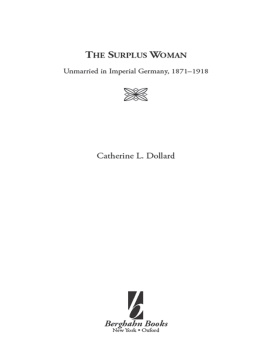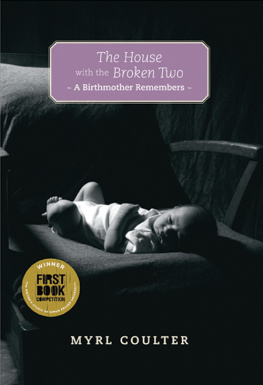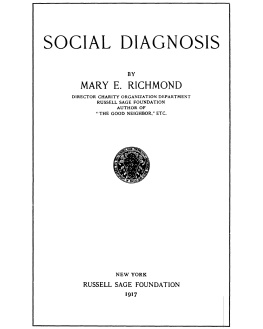First published 2009 by Transaction Publishers
Published 2017 by Routledge
2 Park Square, Milton Park, Abingdon, Oxon OX14 4RN
711 Third Avenue, New York, NY 10017, USA
Routledge is an imprint of the Taylor & Francis Group, an informa business
Copyright by Prudence Mors Rains.
All rights reserved. No part of this book may be reprinted or reproduced or utilised in any form or by any electronic, mechanical, or other means, now known or hereafter invented, including photocopying and recording, or in any information storage or retrieval system, without permission in writing from the publishers.
Notice:
Product or corporate names may be trademarks or registered trademarks, and are used only for identification and explanation without intent to infringe.
Library of Congress Catalog Number: 2007060657
Library of Congress Cataloging-in-Publication Data
Rains, Prudence.
Becoming an unwed mother : a sociological account / Prudence Mors Rains.
p. cm.
Originally published: Chicago : Aldine-Atherton, 1971.
ISBN 978-0-202-30955-2 (alk. paper)
1. Unmarried mothersUnited States.
2. Illegitimate childrenUnited States. I. Title.
HV700.5.R17 2007
306.874'320973dc22
2007060657
ISBN 13: 978-0-202-30955-2 (pbk)
T o J ack and E lliott
This book was originally written as a dissertation in sociology at Northwestern University. Contrary to many rightly made criticisms of graduate education, I did not find my own graduate education to be rigid, parochial, or impersonal. For this, I feel a special debt to the Sociology Department at Northwestern University, particularly to the members of my doctoral committee: John Kitsuse, whose attention and interest can only be described as lavish; Howard Becker, whose benign persistence has served as an example and motive to me, as to many others; and Paul Bohannon, of the Anthropology Department, who provided me with practical help as well as his interest.
During the year I spent at Brandeis University, Irving Zola made lengthy and helpful comments about my field notes from the Project, and Stephen Miller helped me to acquire the National Science Foundation grant that supported the study I made of Hawthorne House.
Additionally, I feel an intellectual debt to the writings of Erving Goffman, David Matza, Lee Rainwater, and Harold Garfinkel; but they are in no way responsible for what I have made of their work in this book.
I owe a very special debt to the staffs and girls at the institutions that I have called the Project, Hawthorne House, and Kelman Place. Maternity homes are understandably cautious about jeopardizing their clients' wishes for secrecy and their right to go through a difficult experience with a minimum amount of intrusion. My analysis has a great deal to say-some of which is criticalabout the orientations of professional social workers toward unwed mothers. Yet it is to the open-mindedness and research orientations of professional social workers that I owe my research and this book.
I owe a very great deal to the trust and grace with which the pregnant girls who came to these places accepted my presence among them. From the Project, I am particularly indebted to the girl I have called Rowena for her candor and natural sociological eye. From Hawthorne House, I am grateful to Dr. Hildreth and the eleven girls in his therapy group for their permission to observe and participate in their sessions.
Finally, I wish to thank the five girls who conducted the interviews regarding contraceptive use among college girls, reported in the first chapter. Because I have not identified the college, I cannot identify them, but I wish to acknowledge the good work they did.
Becoming an unwed mother is the outcome of a particular sequence of events that begins with forays into intimacy and sexuality, results in pregnancy, and terminates in the birth of an illegitimate child. Many girls do not have sexual relations before marriage. Many who do, do not get pregnant. And most girls who get pregnant while unmarried do not end up as unwed mothers. Girls who become unwed mothers, in this sense, share a common career that consists of the steps by which they came to be unwed mothers rather than brides, the clients of abortionists, contraceptively prepared lovers, or virtuous young ladies.
The most significant aspects of this career are moral ones, for sexuality, pregnancy, and motherhood are matters closely linked to conceptions of feminine respectability and intimately connected to women's conceptions of themselves. Becoming an unwed mother is not simply a private and practical trouble; it is the kind of trouble that forces public accounting, raises retrospective questions, and, above all, calls into question the kind of person the unwed mother was and is.
The moral career of an unwed mother is, in this sense, like the moral careers of other persons whose acts are treated as deviant, and whose selves become publicly implicated. Important, if not central, to the moral career of such a person are the social agencies with which he may come into contact as a result of his situation. Social agencies and institutions, whether geared to rehabilitation, incarceration, help, or punishment, provide and enforce interpretations of the person's current situation, of the past that led to it, and of the possibilities that lie ahead. Agencies may do this explicitly, presenting their interpretations as professional understandings based on research and experience. Or, as Erving GofFman ( 1961 ) has so extensively observed, agencies may do this less explicitly through routines for handling clients which contain an implicit statement about the sort of person being dealt with.
This is a study of the moral career of the unwed mother, particularly as this career is shaped by social agencies. The study draws on the experiences of two quite different groups of girls during the time they spent in two quite different institutions for unwed mothers. It deals with the experiences of girls during pregnancywith consequences rather than cause. For while unwed mothers may justify attention as a social problem requiring explanation, they justify more attention as the object of responses which return them to normality. Analyses of other deviant careers have provided insights into the processes of rejection, stigmatization, and exclusion; the moral career of the unwed mother provides an alternate view into the processes of normalization and moral reinstatement.
Most of what has been written about unwed mothers has been concerned explicitly with cause and implicitly with pathology.
Even ignoring this sort of confusion, there is virtually no evidence that unwed mothers share any special characteristics which distinguish them from girls who have not become pregnant (Vincent, 1961; Jones, 1967).
I have, therefore, not made the assumption that critical psychological or motivational differences distinguish unwed mothers from other girls. I have preferred instead to look for the concerns which link the early stages of normal sexual careers with the stages which produce unwed mothers. And I have preferred to understand the special concerns and moral experiences of unwed mothers in relation to the more usual concerns of unmarried girls in coming to terms with sexuality and respectability.










